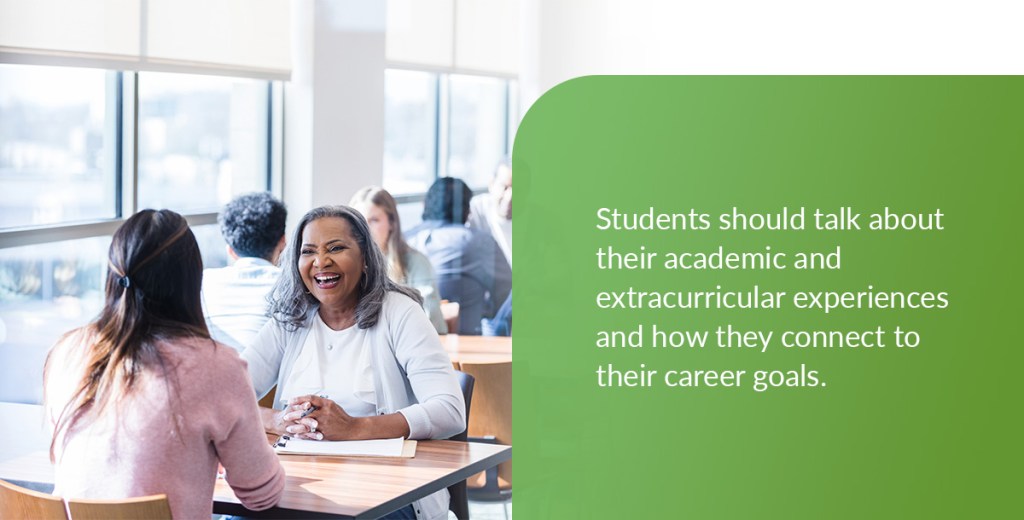The possibility of connecting with a prospective employer at a career fair can be nerve-wracking — we’ve all been there. Fortunately, impressing recruiters can be surprisingly simple with thorough preparation and a confident attitude. Below, we’ll cover essential things to bring to a career fair and other helpful tips.

What’s a Career Fair?
A career fair describes an event where job seekers can:
- Connect with employers.
- Learn about openings.
- Discuss internship opportunities.
- Apply for jobs.
- Establish professional relationships.
Career fairs can be general or industry-specific. Some companies even host career fairs to fill their positions exclusively. The events usually occur in large venues like conference centers, schools and hotels. They can last anywhere from a few hours to several days.
Typically, each organization has a booth or table with a human resources (HR) representative, recruiter or hiring manager. Depending on the company’s needs, an individual can be scheduled for an interview or hired on the spot.
Explore some ways to prepare for a career fair below.
1. Pre-Register for the Event
Many job fairs let participants submit their resumes and other information beforehand. Doing so helps employers learn about these individuals and prescreen them before the event.
2. Research Attending Companies
Before the event, take some time to research different organizations that will attend. By learning about these companies, career fair participants can come prepared with questions about the organization and their openings. Asking questions displays a genuine interest in the company, which can impress employers.
Consider making a priority list of booths, then try to visit them in order of interest. Create a different list of questions for each company based on research.
3. Print Resumes
A resume serves as one of the most vital things to bring to a career fair, as it highlights key skills and experiences for employers. Be sure to bring multiple copies for different companies. An organization representative may even request multiple copies. Career fair participants should update and polish their resumes before the event, ensuring they’re thorough, well-written and error-free.
4. Print Business Cards
Job seekers with dedicated business cards can benefit from bringing them to the career fair. A business card should include the individual’s full name, contact information, current title, brief mission statement and other applicable information. Participants can distribute business cards to companies of interest.
5. Bring a Portfolio
Professional portfolios play an important role in job fairs. They let job searchers showcase their projects and work, showing employers how they have succeeded in previous roles. A portfolio can outline both soft and hard project completion skills. Participants may consider only keeping professional evidence relevant to the fields and careers they’re seeking.
6. Create an Elevator Pitch

An “elevator pitch” describes a 30- to 60-second speech where a person introduces themselves, explains their skills and describes their career objectives. Students should talk about their academic and extracurricular experiences and how they connect to their career goals.
Writing and practicing an elevator pitch can better prepare individuals for what they’ll say when speaking with prospective employers. It’s a simple, direct and effective way to make a lasting impression in a minute or less.
7. Prepare for Common Interview Questions
Participants should practice answering some standard interview questions in case they land an interview at the event. Consider reading over several common interview questions and determine the most accurate ways to answer them.
8. Be Confident
Looking and feeling confident plays a critical role in impressing recruiters and employers. Participants should introduce themselves with a smile and a firm handshake to make a strong first impression. They should be ready to hand over their resume or give their elevator pitch when appropriate.
It’s normal to be a little nervous, but appearing overly timid may be a turnoff to potential employers. Participants should carry themselves calmly and confidently without coming off as too formal or rigid. It’s not just about skills and experience — employers also want to get a feel for personalities.
9. Take Notes
Consider bringing some pens and a small notebook or notepad to the career fair. When visiting different booths, participants can benefit from taking brief notes after each session. They should take a few minutes between each company conversation to jot down key points, such as:
- Who they spoke with.
- General company information.
- Job requirements.
- Salary information.
- Contact information for a representative they met or can follow up with.
10. Network
Aside from speaking with company representatives, career fair participants should try to connect with fellow job seekers. Networking lets job searchers build relationships and share valuable information about different companies, openings and internship opportunities. When visiting organizations at the event, consider requesting information about networking opportunities.
11. Follow Up
After the career fair, participants might consider adding the representatives they met on LinkedIn. They can also send a thank-you message for speaking with them — this simple act can go a long way.
Tips for Virtual Career Fairs
A virtual career fair differs from an in-person one since it relies on technology to connect job seekers and employers. However, participants can prepare for a virtual job fair as they would for an in-person one.
They should research different companies, have their resume and elevator pitch ready, write down a list of questions and take notes of their conversations. Despite the event being online, they should dress professionally as they would for an in-person career fair. Be sure to find a quiet spot with a neutral background before logging on to the event, and test audio and recording equipment before the event begins.
Following up can be important after attending a virtual session, as participants might not have enough time to chat with the team due to time limitations. They can follow up through LinkedIn or request an email address to schedule a chat with representatives they would like to learn more from.
Apply to Danaher Today

Whether preparing for your interview or visiting career offices for guidance during your job hunt, we know that finding a job can be overwhelming. If you’re in the process of a job or internship search, we invite you to join the Danaher Talent Community. Here, you’ll connect with our Talent Acquisition team, get the latest news about our company and receive updates on job openings.
We provide job opportunities in various fields, including life sciences, diagnostics and environmental and applied solutions. Our team members help solve real-world problems, make the world a better place and impact millions of lives.
While we employ over 81,000 people, we foster a tight-knit community where everyone can be heard and make a difference. You can also browse our blog for success stories of individuals who have thrived in their fields and discovered their passions by partnering with Danaher.
We’re here to support your job search and career goals every step of the way. Explore our job openings and apply to Danaher today!

Leave a Reply